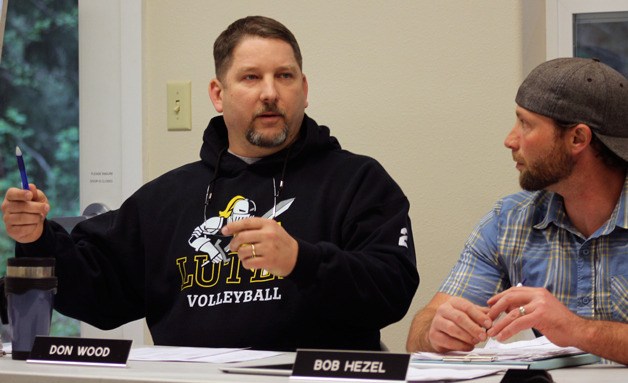An earlier version of this story incorrectly tied a quote by Parks Director Doug Coutts to facility rental, when it was about a code of conduct violation fine system.
Hoping to avoid any problems like the March trespassing ban on a youth soccer coach, South Whidbey Parks & Recreation District commissioners approved new field use and code of conduct policies this past Thursday.
Adopting a parks and facilities user code of conduct creates a foundation for the district to enforce its rules. Back in late February, youth soccer coach Terry Swanson was banned for one year after he ignored staff instruction and used a closed field for informal training with high school soccer athletes. The district lacked set policy about how he should be punished, though commissioners did have the authority to uphold or lift — the unanimous choice of the commissioners — a one-year penalty issued by the Island County Sheriff’s Office.
“I need to have the tools to enforce the rules,” said Tom Fallon, the parks district’s facility and grounds supervisor.
The code lays out violations and their accompanying punishments on a three-step scale. Several offenses result first in a warning, and are followed by a 24-hour or a 30-day ban, depending on the severity of the violation. Smaller transgressions like urinating on a field or smoking within 25 feet of a building or a playground would only constitute warnings. Potentially dangerous misdeeds, such as possessing fireworks, carry 30-day bans outright.
Fallon reminded the commissioners of his tasks that often involve enforcing common-sense rules. Recently, he had to clean up paintball splatter and stains at the Community Park playground and found someone had dumped an old pink bathtub and a pair of tires on park district property.
“It’s really hard to go up and tell people not to smoke,” Fallon said. “It’s hard enough to tell people not to drink at birthday parties [in the park].”
Field use carries the general principle set by the board in March that the parks will favor field and facility access over condition. At least one field will be kept open for each field sport — football, soccer, baseball, softball, ultimate — throughout the year. The tipping point is if field conditions become knowingly hazardous to users.
Related to field and facility use, Fallon requested the district look into rental fees for the picnic shelters and other structures.
Parks Director Doug Coutts said the Municipal Research and Services Center recommended he create a rental policy. He said there was concern that letting someone occupy a picnic shelter for a single use, such as a birthday party, could be seen as a gift of public funds because the area essentially becomes private and not public.
“Our picnic shelters and structures are being absolutely pounded,” Fallon said.
The commissioners considered implementing a fine system with the code of conduct. But Coutts said he was advised by MRSC to research if other districts had such a policy or program.
“I don’t think there’s anybody doing it at this time,” he said.
The idea of holding a deposit check to encourage cleanup of the area was proposed as a compromise between the two issues.
For all the bluster of the past few public parks district meetings, Thursday’s was quiet. One public comment was submitted by Molly MacLeod-Roberts, who applauded the district working with user groups to create a filled-out schedule of field and facility use.
“It sounds like you’ve come up with a sound policy,” she said.



